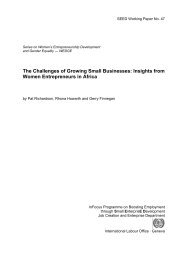manual: women workers' rights and gender equality - International ...
manual: women workers' rights and gender equality - International ...
manual: women workers' rights and gender equality - International ...
Create successful ePaper yourself
Turn your PDF publications into a flip-book with our unique Google optimized e-Paper software.
Working in a very noisy area<br />
If you are unable to speak in a normal way st<strong>and</strong>ing one arm’s length from another worker then the<br />
noise level is too high. The employer should undertake action to reduce the noise as much as<br />
possible. Possibilities are: enclose the machine or very noisy parts of the machine <strong>and</strong> regularly<br />
service the machine to keep it in a good shape <strong>and</strong> reduce the noise.<br />
Working with machines that make a lot of noise will damage your hearing. You should wear protection<br />
when working in noisy areas. Ask your employer to provide hearing protection; of course this should be<br />
of good quality, otherwise it does not help. This is mentioned in Prakas 125, article 4, see under dust.<br />
Ergonomics<br />
This applies to all workers: office workers should have proper furniture to make sure they do not<br />
get problems with their back or arms due to a wrong working position. Homeworkers often work in<br />
bad physical positions. They often sit on the ground or on small chairs that are too low. Back<br />
problems are common among these workers.<br />
Where to complain<br />
When a worker likes to complain about occupational safety <strong>and</strong> health issues he or she can go to<br />
the Office of OSH which is part of the Ministry of Social Affairs, Labor, Veterans <strong>and</strong> Youth.<br />
Another option is to go to the trade union if you are a member. In rural areas (<strong>and</strong> in urban areas<br />
in the case of workers without a contract), local officials will receive a complaint from workers <strong>and</strong><br />
may or may not act on those complaints. You will have a higher chance that action will be<br />
undertaken, if you organize in a group <strong>and</strong> lodge a complaint. Direct compensation is the most<br />
common method of dealing with accidents stemming from dangerous workplaces.<br />
Related sessions <strong>and</strong> briefing notes<br />
4.13 Maternity Protection<br />
4.14 Sexual Harassment<br />
Briefing Note 8 Health Rights <strong>and</strong> Work<br />
Briefing Note 9 Violation of Rights at Work: File a Complaint<br />
134

















